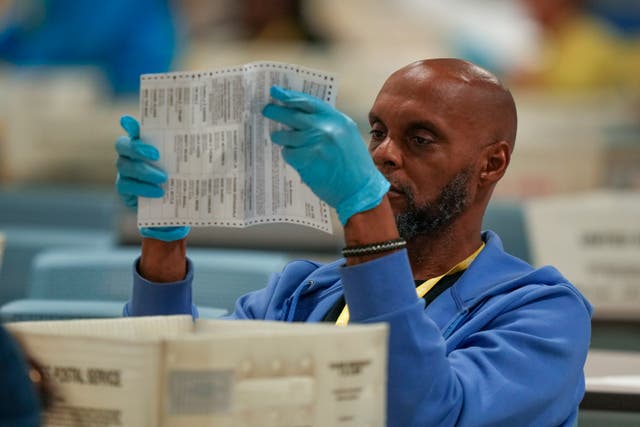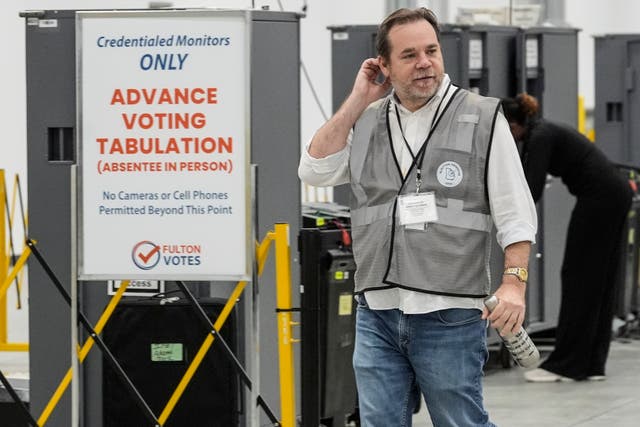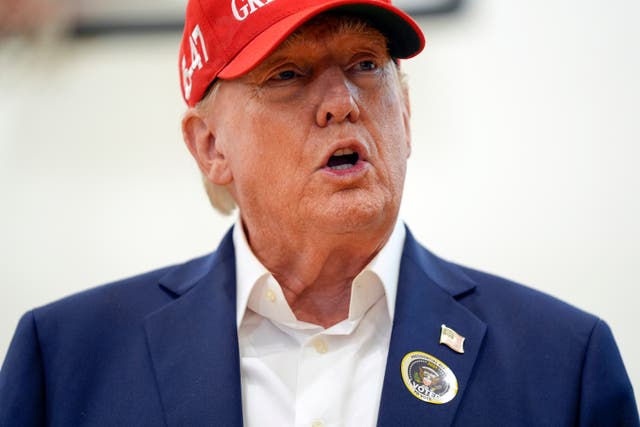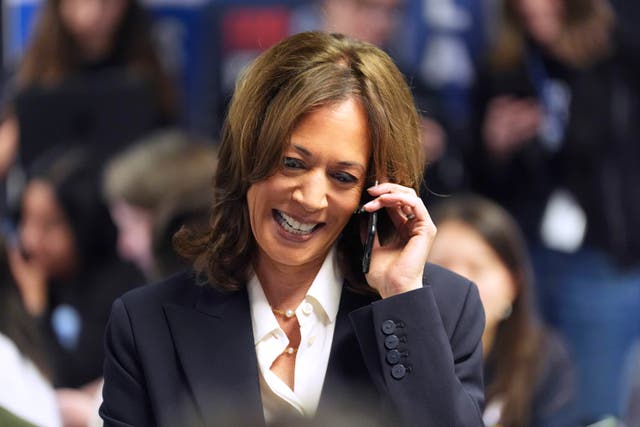Election Day unfolds relatively smoothly despite Trump’s unsubstantiated claims
The run-up to the election has been marked by concerns over disinformation, foreign influence and threats to election workers and voting systems.

Polling day has unfolded relatively smoothly across the United States with only scattered disruptions and delays.
A series of bomb threats turned out to be hoaxes in parts of Georgia and Arizona, two presidential battleground states, and federal officials warned that Russia was seeking to sow chaos and uncertainty into America’s vote for president.
And despite no evidence of widespread problems, former president Donald Trump made unsubstantiated claims related to Philadelphia and Detroit, the biggest cities in two states that will be crucial for deciding the presidency.
Local officials were quick to pour cold water on the claims Mr Trump made on his social media platform, saying they had seen nothing amiss.

It was expected that at least half of all votes to be cast had already come in by Tuesday, with more than 84 million Americans voting early. There were just a few hiccups and frustrations during early voting in the presidential battlegrounds of Pennsylvania and Michigan.
The problems that cropped up on the final day of voting were “largely expected, routine and planned-for events,” said Cait Conley, senior adviser to the director of the Cybersecurity and Infrastructure Security Agency. The agency was not seeing any significant national incidents affecting election security, she said.
In Milwaukee, election officials said they were recounting more than 30,000 postal votes “out of an abundance of caution” after it was discovered that doors on the back of ballot scanners were not properly sealed. The effort, which drew the attention of Mr Trump and the Republican National Committee, was expected to delay the count there.
Voters also faced some more typical election mishaps. In Arizona’s Maricopa County, one voting location was slightly delayed when a worker forgot to bring a key. In Pennsylvania’s Allegheny County, an election judge failed to show up at the polls.
Some voters were delayed around the country because of problems checking-in at polling stations. Ballot printing mistakes in some areas required voting hours to be extended. And extreme weather across the middle of the country caused flooding and isolated power outages, including one that forced a polling station to use a generator to keep voting up and running.
In the western part of the key swing state of Pennsylvania, a few counties saw reports of issues with tabulator machines that scan and count paper ballots filled in by voters. A Pennsylvania state judge ordered polls to remain open for two extra hours in Cambria County, which voted 68% for former president Donald Trump in 2020. The county sought the extension after a software malfunction affected the ballot-scanning machines, though county officials said no one was turned away from the polls and all ballots would be counted.
Bomb threats mobilised law enforcement in Arizona and Georgia. They were reported at various times throughout the day in three metro Atlanta counties, all with large numbers of Democratic voters. About a dozen polling places in all three counties stayed open late. Bomb threats also were reported at three voting locations in Navajo County, Arizona, according to the secretary of state’s office.
The FBI on Tuesday afternoon said it was aware of multiple hoax bomb threats to polling locations in several states and said many of them appeared to originate from Russian email domains.

The massive early voting turnout before Tuesday – slightly more than half the total number of votes in the presidential election four years earlier – was driven partly by Republican voters, who cast early ballots at a higher rate than in recent previous elections after a campaign by Mr Trump and the Republican National Committee to counter the Democrats’ long-standing advantage in the early vote.
The early voting period faced minimal problems, even in western North Carolina, which was hammered last month by Hurricane Helene. State and local election officials, benefiting from changes made by the Republican-controlled legislature, pulled off a herculean effort to ensure residents could cast their ballots as they dealt with power outages, lack of water and washed out roads. That appeared to continue on Tuesday, with the North Carolina Board of Elections reporting no voting issues.
Besides the hurricanes in North Carolina and Florida, the most worrisome disruptions to the election season so far were arson attacks that damaged ballots in two drop boxes near the Oregon-Washington border. Authorities there were still searching for the person responsible.
The absence of any significant, widespread problems has not stopped Mr Trump, the Republican nominee, or the RNC, from making numerous claims of fraud or election interference during the early voting period, a possible prelude to challenges after polling day.

Mr Trump on Tuesday suggested he would not challenge the results of the election – as long as it is fair.
“If it’s a fair elections, I’d be the first one to acknowledge” the results, Mr Trump said. It was not clear, hpowever, what he sees as meeting that definition.
As Election Day voting neared its end, the former president began making unsubstantiated claims about voting and law enforcement in the biggest cities in Michigan and Pennsylvania.
He said on his social media platform that there was “talk about massive cheating in Philadelphia” and said law enforcement was on the way. He did not provide details, and there was no immediate indication of what he was referring to.
Philadelphia district attorney Larry Krasner issued a statement responding to Mr Trump’s post, saying the only suggestion of cheating was coming from the Republican presidential nominee.
“There is no factual basis whatsoever within law enforcement to support this wild allegation,” Mr Krasner said. “We have invited complaints and allegations of improprieties all day. If Donald J. Trump has any facts to support his wild allegations, we want them now. Right now. We are not holding our breath.”
One of three Philadelphia election board members, Seth Bluestein, a Republican, said on social media there is “absolutely no truth to this allegation. It is yet another example of disinformation.” Voting in the city is “safe and secure,” he said.
Police in Detroit were equally puzzled by another post by Mr Trump that said: “Philadelphia and Detroit! Heavy Law Enforcement is there!”
Detroit police said there were no reported issues inside or outside of Huntington Place, the massive convention room where election workers were to count ballots.
Evening traffic outside the centre was light with no protesters in sight. Barricades were up outside the room and escalators to and from the area were shut off. Police also reported no major problems in the city’s more than 400 voting precincts.

Mr Trump’s Democratic opponent, vice president Kamala Harris, has urged voters not to fall for Mr Trump’s tactic of casting doubt on elections. She was spending Tuesday afternoon turning out her own vote at a phone bank hosted by the Democratic National Committee, and said phone banking represents “the best of who we are”.





